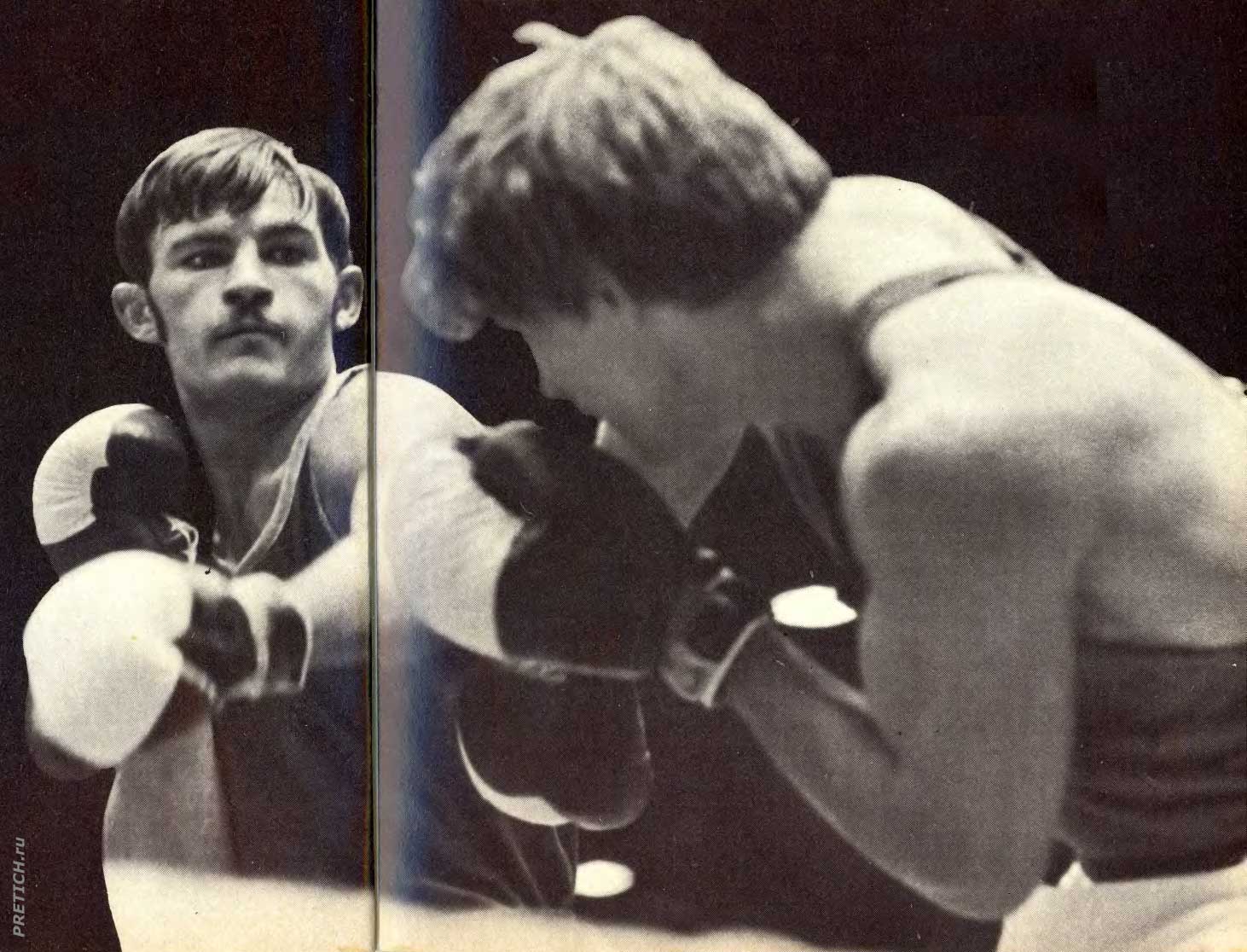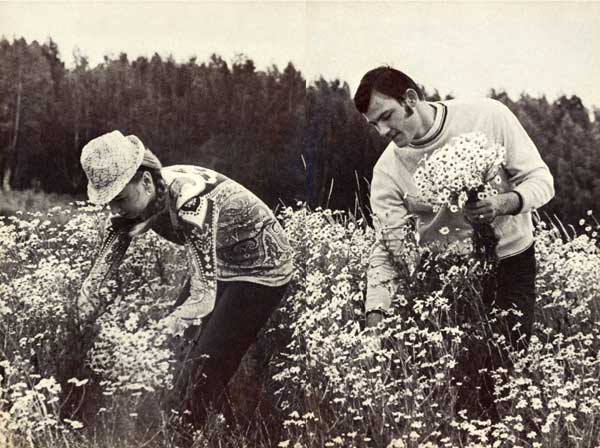Ring Champion - Vyacheslav Lemeshev
by Lev Lebedev
from the magazine Ogonyok
I had often seen Olympic and European champion Vyacheslav Lemeshev in the ring — both from a ringside seat and on television But 1 wanted to meet him personally.
For a start I looked up a man who has known him for a long time — Yuri Radonyak, senior boxing coach of the USSR national team and Lemeshev’s trainer.

Radonyak's story was absolutely essential, not only because it enabled me to look at the middleweight Olympic titleholder through the eyes of a man who is in daily contact with him, but also because Vyacheslav himself is extremely taciturn.
Lemeshev agreed to meet me at the Soviet Army Palace of Sports. He was easy to recognise by his blond brush moustache He is tall, youthfully slender, his body is supple.
Radonyak: "Who knows where he gets his flair from? He seems to see, sense and anticipate his opponent's every move. I don't believe there's an amateur boxer in the world today who isn't a little scared of Lemeshev, especially his famous right."
Many boxing fans knew that this right was injured during the European Championships in Belgrade and on Lemeshev's return home his friends who wished to congratulate him on his gold medal had to forgo shaking hands.
"What happened to your hand?"
"I damaged it in my first bout."
Vyacheslav showed his hand the back of his wrist was badly swollen.
Radonyak: "He injured his right hand back in Munich, actually, at the Olympic Games, but not seriously. So he thought it would clear up quickly."
"I could hardly pull my glove on," Vyacheslav commented about Belgrade.
"It made winning very difficult?"
"Harder than at the Olympics. In Munich I was in good form, but in Yugoslavia..."
Radonyak: "Vyacheslav was ready for the Olympics. He's very hardworking, he trains long and seriously. He rehearses a bout with his unseen opponent down to the last detail."
"Which fight did you find the toughest in Belgrade?"
"The one with the Romanian, Nestac. The final bout. The Romanian boxers are a serious lot. And of course Nestac knew that my right hand left something to be desired. In the first round I was knocked down."
"But in the third round you used your right to good advantage. Had the pain gone?"
"On the contrary, the pain-killer shot was wearing off."
"But you decided to win at any cost?"
"Well, I'd say I wanted to win very much,"
Radonyak: "Vyacheslav is a different man in the ring, though he keeps cool and calm at all times. He second- guesses his opponent, anticipates his every move and finally catches him with that right. That's what happened in the decisive bout with Nestac. He threw that hurt hand in the third round and scored a knockout."
"How do you explain the power of your right?" 1 asked Lemeshev.
"I don't think it can be explained in words. It’s probably a matter of correct timing...
Radonyak: "Lemeshev can judge distance down to a millimetre, practically. Not only does he have a powerful right, but he utilises the other fellow's forward motion. And his reactions are instantaneous. Even though everybody knows now that his best punch is his right, he still manages to use it effectively and rarely misses."
Lemeshev has had 104 fights and won 98 of them.
"'Which was your hardest fight?" I asked.
"I think with the American, Johnson, in Yerevan."
Radonyak: "The Armenian capital was host to a tournament between US and Soviet boxers and the bout between Lemeshev and Johnson was among the most stubbornly fought. At that time Slava couldn't find the key to Johnson's defence and he lost."
Until the moment that the referee actually raised Johnson's hand, the American boxer was not at all certain that he had won. In token of his respect for Lemeshev's abilities, he presented the Soviet boxer with his own championship medal of the Pan-American Games. However, the two boxers were destined to meet again at the Olympics.
Radonyak: "Before Munich, Vyacheslav prepared himself for Johnson's style and to good purpose. Johnson eliminated one opponent after another at the Olympic and then came the Johnson-Lemeshev bout. It seemed to me that the American appeared confident of victory, yet Lemeshev won and moreover by a knockout."
That semi-final between Lemeshev and Johnson in Munich vividly illuminates Lemeshev's character. In Germany, Nestac lost to the Cuban, Montoya, and Montoya in turn, to Johnson...
Lemeshev fought the very strong boxer Montoya in Cuba.
"It was like running into a tank," Vyacheslav recalls.
Radonyak: "I think a lot of people believed that Montoya would knock out Lemeshev. Vyacheslav doesn't look strong, whereas Montoya is the incarnation of power. However, Montoya was the one knocked out."

Lemeshev's non-boxerlike appearance has deceived many experts. The first to spot his potential was Trud sports society boxing coach Lev Segalovich. The Merited Master of Sports and Merited Trainer of the USSR jokingly calls himself the Lemeshev family coach. Vyacheslav's older brothers, Yevgeni and Yuri, both boxed under Segalovich's tutelage and both became Masters of Sports. They brought the future Olympic champion to their coach when the boy was 14 years old.
Radonyak: "Vyacheslav became USSR junior champ in 1969. I remember when Segalovich first suggested I take a look at his boy. He created an odd impression: height — 187 centimetres, weight — only 71 kilogrammes. His defence was unorthodox but he was hard to hit. I sparred with him and discovered a powerful right hand. In 1970 Lemeshev won the European junior title. But of course the real test lay ahead — boxing against adults. At the USSR championships when he came up against Tolkov, I threw in the towel in the second round — there was no point taking a chance, Tolkov was obviously the stronger fighter."
Indeed, Lemeshev has had his setbacks, but they never got him down. The last time he was defeated was at the USSR Spartakiade in 1971.
"Perhaps holding the Olympic title helps you to win?"
"On the contrary," he replied
He is right, of course. Every opponent wants to beat the reigning champion and comes up with his best effort.
Radonyak: "The Olympic title does increase the pressure. You feel a heightened obligation. Everyone expects Lemeshev to win by a kayo. Yet before the Olympic Games some people said, 'What kind of a boxer is he? Why include him on the team?' The whole thing is that in training sessions Slava does not hit hard. And his style bothers many. That's the way he is, different from others."
There is no doubt that today Junior Lieutenant Vyacheslav Lemeshev is one of the Soviet Union's top boxers. Segalovich believes, for instance, that he can repeat Boris Lagutin's record — become a two-time Olympic winner — or maybe even the Hungarian Laszlo Papp's — triple gold medallist.
Sputnik. №5 May 1974 |

